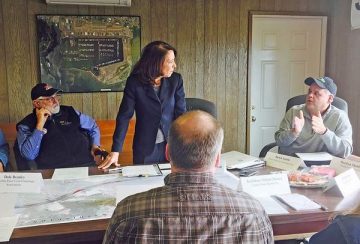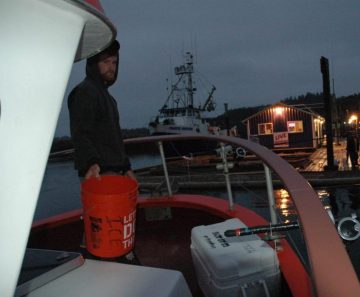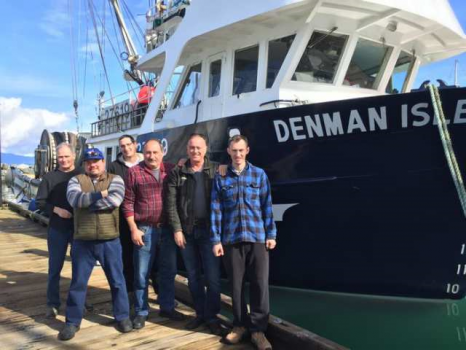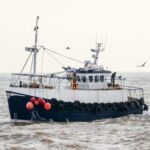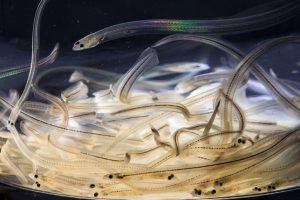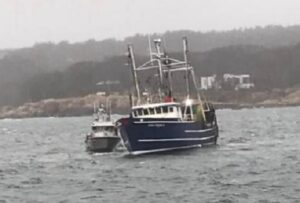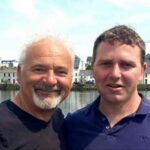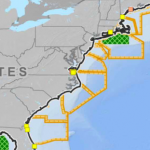Category Archives: Pacific
Researchers: Columbia spring chinook forecast might be too high
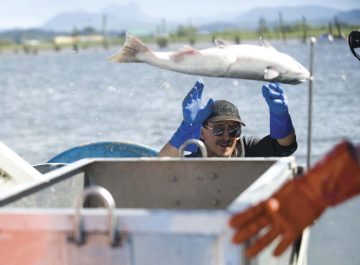 Fisheries managers have been predicting a slightly below-average run of spring chinook salmon on the Columbia River this year, but a newly published suggests that it may be worse. According to researchers from Oregon State University and the National Oceanic and Atmospheric Administration, ocean conditions were historically bad in the spring of 2015, when migrating yearling fish that will comprise the bulk of this spring’s adult chinook salmon run first went out to sea. In fact, Pacific Decadal Oscillation values — which reflect warm and cold sea surface temperatures — suggest it was one of the warmest nearshore oceans encountered by migrating chinook salmon dating back to at least 1900. The lack of food for the salmon in 2015 may have resulted in significant mortality that will show in this year’s run of Columbia River springers. One way or another, it will provide new information on fish survival and whether juvenile salmon prey data can help resource managers predict future returns. continue reading the story here 10:11
Fisheries managers have been predicting a slightly below-average run of spring chinook salmon on the Columbia River this year, but a newly published suggests that it may be worse. According to researchers from Oregon State University and the National Oceanic and Atmospheric Administration, ocean conditions were historically bad in the spring of 2015, when migrating yearling fish that will comprise the bulk of this spring’s adult chinook salmon run first went out to sea. In fact, Pacific Decadal Oscillation values — which reflect warm and cold sea surface temperatures — suggest it was one of the warmest nearshore oceans encountered by migrating chinook salmon dating back to at least 1900. The lack of food for the salmon in 2015 may have resulted in significant mortality that will show in this year’s run of Columbia River springers. One way or another, it will provide new information on fish survival and whether juvenile salmon prey data can help resource managers predict future returns. continue reading the story here 10:11
Two guys who tried to sink their own commercial charter fishing boat get probation
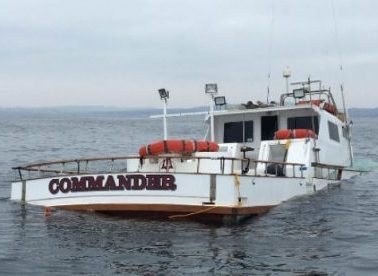 Two men who intentionally tried to sink their commercial fishing boat in an effort to collect insurance money were sentenced to probation Monday. U.S. District Court Judge Michael Anello sentenced Christopher Switzer, 39, and Mark Gillette, 37, to 18 months of probation. Both pleaded guilty in February to conspiring to sink their commercial fishing boat, “The Commander.” The incident occurred on Oct. 11 when the two were rescued by the U.S. Coast Guard from the sinking boat in an area about seven miles south of Dana Point. Gillette had reported the boat was taking on water and was in danger of sinking. It did not, however. continue reading the story here 10:45
Two men who intentionally tried to sink their commercial fishing boat in an effort to collect insurance money were sentenced to probation Monday. U.S. District Court Judge Michael Anello sentenced Christopher Switzer, 39, and Mark Gillette, 37, to 18 months of probation. Both pleaded guilty in February to conspiring to sink their commercial fishing boat, “The Commander.” The incident occurred on Oct. 11 when the two were rescued by the U.S. Coast Guard from the sinking boat in an area about seven miles south of Dana Point. Gillette had reported the boat was taking on water and was in danger of sinking. It did not, however. continue reading the story here 10:45
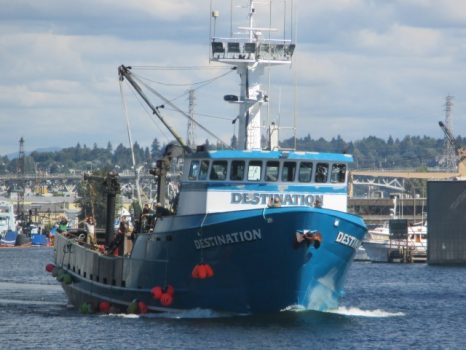
Crew of lost crabbing vessel declared legally dead
The six men lost when their crabbing boat sank on a cold morning in the Bering Sea last month were declared legally dead at an unusual court proceeding Monday, allowing heartbroken families to take a first step toward closure and settling their loved ones’ affairs. The proceeding, known as a presumptive death hearing, is a kind of mini-trial held to determine whether a missing person can be declared dead. They are often held in the cases of people who have disappeared in such extreme terrain as to have exhausted the chances of survival or recovery. The fishing vessel Destination sank 3 miles north of St. George Island on the morning of Feb. 11, just before starting the winter snow crab season. The bodies of the men aboard — captain Jeff Hathaway and crew members Kai Hamik, Darrik Seibold, Larry O’Grady, Raymond Vincler and Charles G. Jones — have not been found. continue reading the story here 23:34
Captain of Fishing Vessel Pleads Guilty for Discharging Waste into the Ocean
 A captain of the fishing vessel (F/V) Native Sun pleaded guilty Friday in federal court in Seattle, Washington, for discharging oily-waste directly into the ocean in violation of the Act to Prevent Pollution from Ships (APPS) and the federal conspiracy statute. Randall Fox pleaded guilty before U.S. District Court Judge Lasnik of the Western District of Washington to two criminal felony counts for violating APPS’ prohibition against discharging oily-wastes, namely machinery-space bilge water, directly into the ocean. According to court documents, Randall Fox, and other co-conspirators, repeatedly discharged the oil-contaminated bilge water into the ocean using unapproved submersible pumps and hoses. On at least one occasion, such a discharge left a sizable oily-sheen along the surface of the water that trailed alongside the F/V Native Sun. Trial for vessel owner Bingham Fox is currently set to begin March 21, 2017. Read the rest here 15:38
A captain of the fishing vessel (F/V) Native Sun pleaded guilty Friday in federal court in Seattle, Washington, for discharging oily-waste directly into the ocean in violation of the Act to Prevent Pollution from Ships (APPS) and the federal conspiracy statute. Randall Fox pleaded guilty before U.S. District Court Judge Lasnik of the Western District of Washington to two criminal felony counts for violating APPS’ prohibition against discharging oily-wastes, namely machinery-space bilge water, directly into the ocean. According to court documents, Randall Fox, and other co-conspirators, repeatedly discharged the oil-contaminated bilge water into the ocean using unapproved submersible pumps and hoses. On at least one occasion, such a discharge left a sizable oily-sheen along the surface of the water that trailed alongside the F/V Native Sun. Trial for vessel owner Bingham Fox is currently set to begin March 21, 2017. Read the rest here 15:38
Estranged daughter sues ‘Deadliest Catch’ star Sig Hansen, alleging she was molested as a child
 The estranged daughter of celebrity Alaskan crab boat captain and cable TV star Sig Hansen claims her father sexually abused her as a toddler, while her parents were divorcing nearly three decades ago, according to interviews and court records. As a result of the alleged abuse, Melissa Eckstrom, now a 28-year-old family law attorney in Seattle, contends in a lawsuit that she battled depression, eating disorders, suicidal thoughts and other trauma throughout her childhood. She also claims that she still harbors memories of her father’s abuse of her as a 2-year-old in 1990. “I have memories … of being in a room alone with my father and crying out in pain,” Eckstrom stated in a court declaration. Read the story here. (I ain’t buying it) 10:06
The estranged daughter of celebrity Alaskan crab boat captain and cable TV star Sig Hansen claims her father sexually abused her as a toddler, while her parents were divorcing nearly three decades ago, according to interviews and court records. As a result of the alleged abuse, Melissa Eckstrom, now a 28-year-old family law attorney in Seattle, contends in a lawsuit that she battled depression, eating disorders, suicidal thoughts and other trauma throughout her childhood. She also claims that she still harbors memories of her father’s abuse of her as a 2-year-old in 1990. “I have memories … of being in a room alone with my father and crying out in pain,” Eckstrom stated in a court declaration. Read the story here. (I ain’t buying it) 10:06
Oregon adopts Columbia River salmon reforms
 Oregon’s Fish and Wildlife Commission took another try Friday at adopting Columbia River salmon management reforms, but it’s still unclear if the policies will satisfy Washington’s commission. In January, the Oregon commission adopted revised reforms which were more friendly to gillnet fishermen. Following a backlash from sportsmen, Oregon Gov. Kate Brown sent the Oregon commission a scolding letter that directed the panel adopt a position closer to the details adopted in 2013 and more akin to Washington’s position. Oregon commission member Greg Wolley of Portland said he got a call from Brown on Thursday. The proposal adopted on Friday meets the spirit of her letter and the compromise Brown wanted, Wolley said. Brad Smith, chairman of the Washington Fish and Wildlife Commission, sent a letter to Michael Finley, his Oregon counterpart, on Wednesday indicating that Washington felt the plan it adopted in January already was a compromise from the original 2012 agreement. “I’m really uncomfortable with this,’’ said Oregon commission member Holly Akenson of Enterprise, who added the plan does not do enough for commercial fishermen. Read the story here 09:09
Oregon’s Fish and Wildlife Commission took another try Friday at adopting Columbia River salmon management reforms, but it’s still unclear if the policies will satisfy Washington’s commission. In January, the Oregon commission adopted revised reforms which were more friendly to gillnet fishermen. Following a backlash from sportsmen, Oregon Gov. Kate Brown sent the Oregon commission a scolding letter that directed the panel adopt a position closer to the details adopted in 2013 and more akin to Washington’s position. Oregon commission member Greg Wolley of Portland said he got a call from Brown on Thursday. The proposal adopted on Friday meets the spirit of her letter and the compromise Brown wanted, Wolley said. Brad Smith, chairman of the Washington Fish and Wildlife Commission, sent a letter to Michael Finley, his Oregon counterpart, on Wednesday indicating that Washington felt the plan it adopted in January already was a compromise from the original 2012 agreement. “I’m really uncomfortable with this,’’ said Oregon commission member Holly Akenson of Enterprise, who added the plan does not do enough for commercial fishermen. Read the story here 09:09
Fukushima radiation not cause for alarm in US
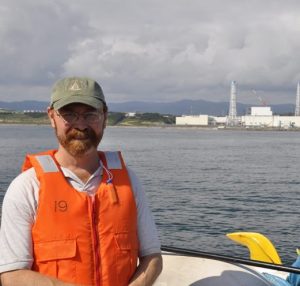 Radiation from the Fukushima nuclear reactor disaster in Japan has reached North American shores, but — despite a number of reports shared on social media— scientists say the levels of radiation are so low that it poses no risk to public health. Late last year, researchers announced that Cesium-134 was discovered in waters off the coast of Oregon and in one sockeye salmon in a British Columbia lake. The news reports have been used as the basis for viral stories about the radiation. One story from alternativemediasyndicate.com carried the headline: “Fukushima Radiation: Your Days of Eating Pacific Ocean Fish Are Over, Or Worse.” Another story from organicandhealthy.org labeled the discovery of the salmon as “bad news for everyone” and described the U.S. West Coast as “contaminated.” Ken Buesseler, a senior scientist at Massachusetts’ Woods Hole Oceanographic Institution, has traveled to Japan numerous times since 2011 to study the Fukushima disaster’s effect on seawater. continue reading the story here 18:19
Radiation from the Fukushima nuclear reactor disaster in Japan has reached North American shores, but — despite a number of reports shared on social media— scientists say the levels of radiation are so low that it poses no risk to public health. Late last year, researchers announced that Cesium-134 was discovered in waters off the coast of Oregon and in one sockeye salmon in a British Columbia lake. The news reports have been used as the basis for viral stories about the radiation. One story from alternativemediasyndicate.com carried the headline: “Fukushima Radiation: Your Days of Eating Pacific Ocean Fish Are Over, Or Worse.” Another story from organicandhealthy.org labeled the discovery of the salmon as “bad news for everyone” and described the U.S. West Coast as “contaminated.” Ken Buesseler, a senior scientist at Massachusetts’ Woods Hole Oceanographic Institution, has traveled to Japan numerous times since 2011 to study the Fukushima disaster’s effect on seawater. continue reading the story here 18:19
Man vs. mammal, commercial herring fisherman films sea lion feeding frenzy
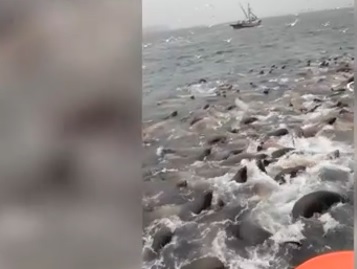 It’s the age old fight over who gets the fish, man or sea lion. For commercial fisherman Allan Marsden, he’s fed up with the burgeoning sea lion population along the B.C. coast impeding his ability to do his job. Roe herring are fished for their eggs and the fishery takes place as the herring gather to spawn. The window is short — late February to early March — for fishermen to make their quota and Marsden says this year they were unable to make their targets. Marsden puts a lot of the onus on the sea lions. “The sea lions keep the herring down so we can’t get at them. They just make it virtually impossible to put the gear in the water sometimes,” Marsden explains. Video, read the story here 19:05
It’s the age old fight over who gets the fish, man or sea lion. For commercial fisherman Allan Marsden, he’s fed up with the burgeoning sea lion population along the B.C. coast impeding his ability to do his job. Roe herring are fished for their eggs and the fishery takes place as the herring gather to spawn. The window is short — late February to early March — for fishermen to make their quota and Marsden says this year they were unable to make their targets. Marsden puts a lot of the onus on the sea lions. “The sea lions keep the herring down so we can’t get at them. They just make it virtually impossible to put the gear in the water sometimes,” Marsden explains. Video, read the story here 19:05
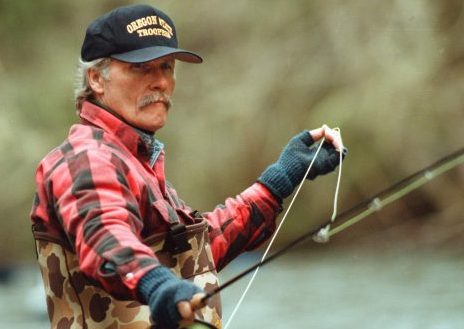
Op-Ed: Kitzhaber salmon policy failed to meet its goals – Ryan Rogers, owner of the Fisherman’s Market
Not all Oregonians are financially or physically able to take time away from work and family to catch their own Columbia River salmon. That’s where I come in: I sell Oregon’s signature fish to my customers, and they love it. My supply of salmon comes from the commercial fishing families who fish the Columbia. Some of them have been doing so for generations. However, their future — and Oregon consumers’ future supply of Columbia River salmon — is now at risk. Some politicians and special interest groups are attacking the Oregon Fish & Wildlife Commission for following fish science and Oregon law and, basically, doing its job. At its January meeting, the commission modified Gov. John Kitzhaber’s 2012 Columbia River plan. The sport-fishing interests are upset. Now, this isn’t a (fish) story about fish decline. And it’s not a story about fish conservation. Read the op-ed here 12:05
Op-ed: Oregon Fish & Wildlife Commission applauded for following the science
 Serving on one of Oregon’s independent commissions is often a thankless job. We owe our thanks to Oregonians who do so. It’s not easy when the issues are complex and contentious. They don’t get any more complex or contentious than fish allocation on the Columbia River. That’s why I applaud the January decision of the Oregon Fish & Wildlife Commission and take exception to unfounded criticism from some politicians and special interests groups. Commissioners followed the science and Oregon law with respect to both the 2012 Kitzhaber Columbia River plan and their duties as members of an independent commission.,, This plan merely takes harvested fish away from commercial fishing families who fish for all consumers and gives harvest opportunities to sport fishermen who can get out on the Columbia to catch their own fish. read the op-ed here 08:59
Serving on one of Oregon’s independent commissions is often a thankless job. We owe our thanks to Oregonians who do so. It’s not easy when the issues are complex and contentious. They don’t get any more complex or contentious than fish allocation on the Columbia River. That’s why I applaud the January decision of the Oregon Fish & Wildlife Commission and take exception to unfounded criticism from some politicians and special interests groups. Commissioners followed the science and Oregon law with respect to both the 2012 Kitzhaber Columbia River plan and their duties as members of an independent commission.,, This plan merely takes harvested fish away from commercial fishing families who fish for all consumers and gives harvest opportunities to sport fishermen who can get out on the Columbia to catch their own fish. read the op-ed here 08:59
Commercial sockeye fishery faces closure on North Coast
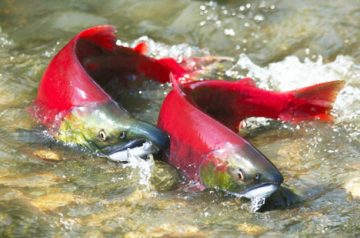 If the Department of Fisheries and Oceans were using a Magic 8 Ball to determine the future of sockeye salmon fishery in the Skeena the answer would be — Outlook Not So Good. Early forecasts for sockeye salmon are poor and there is a possibility there won’t be a commercial fishery for the year. “We’re facing a really challenging year,” said Colin Masson, DFO’s area director for the North Coast. The forecasts are based on the sockeye that went to sea in 2014 and 2015, as well as the number of sockeye jacks, the premature fish who return a year early. Both indicators suggest the outlook is not good. For DFO to plan commercial fisheries, the total return of sockeye has to be greater than 1.05 million. continue reading the story here 10:50
If the Department of Fisheries and Oceans were using a Magic 8 Ball to determine the future of sockeye salmon fishery in the Skeena the answer would be — Outlook Not So Good. Early forecasts for sockeye salmon are poor and there is a possibility there won’t be a commercial fishery for the year. “We’re facing a really challenging year,” said Colin Masson, DFO’s area director for the North Coast. The forecasts are based on the sockeye that went to sea in 2014 and 2015, as well as the number of sockeye jacks, the premature fish who return a year early. Both indicators suggest the outlook is not good. For DFO to plan commercial fisheries, the total return of sockeye has to be greater than 1.05 million. continue reading the story here 10:50
Steelheaders call for Buckmaster’s removal from fish commission
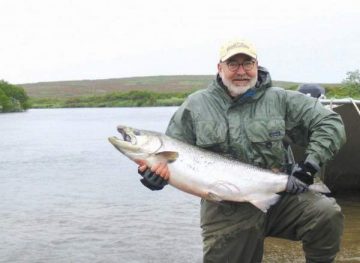 In the latest development in the feud between sports anglers and commercial fishermen over the use of gillnets in the lower Columbia River, a sports angling group is petitioning the governor to remove a state fish and wildlife commissioner who voted with three others to continue to allow the practice in late January. The Association of Northwest Steelheaders submitted a petition last week signed by nearly 6,000 people calling on Gov. Kate Brown to remove Commissioner Bruce Buckmaster. Buckmaster, a Brown appointee, has served on the Oregon Fish and Wildlife Commission since 2015. Detractors argued at the time he was a lobbyist for the commercial gillnetting industry, a claim which Buckmaster denied. continue reading the article here 21:08
In the latest development in the feud between sports anglers and commercial fishermen over the use of gillnets in the lower Columbia River, a sports angling group is petitioning the governor to remove a state fish and wildlife commissioner who voted with three others to continue to allow the practice in late January. The Association of Northwest Steelheaders submitted a petition last week signed by nearly 6,000 people calling on Gov. Kate Brown to remove Commissioner Bruce Buckmaster. Buckmaster, a Brown appointee, has served on the Oregon Fish and Wildlife Commission since 2015. Detractors argued at the time he was a lobbyist for the commercial gillnetting industry, a claim which Buckmaster denied. continue reading the article here 21:08
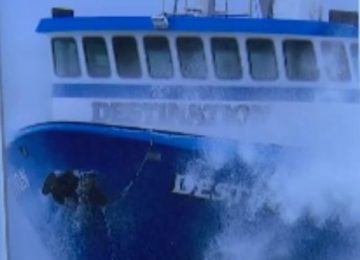
Destination crew remembered at 89th “Blessing of the Fleet” ceremony
It’s been one month and one day since the Destination mysteriously disappeared in Alaskan waters. The Seattle-based crabbing boat went missing in the Bering Sea and all six crew members with it. On Sunday, the fishing community marked its 89th “Blessing of the Fleet” at Seattle’s Fisherman’s Terminal. Lutheran ministers raised a flag above a boat named St. Anthony and wished safe passage for all who risk their lives at sea. However, it was Destination that was on the minds of many people who attended. “I come to the blessing every year,” Laurel Schultz of Gig Harbor said. Schultz’s cousin worked on a crab boat and was lost at sea in 1989. “I’m drawn to this every year because it’s a powerful experience. It brings together a group of people who care about fishermen and women,” Schultz said. Video, photo’s, read the story here 10:00
Coast Guard medevacs fisherman near Cold Bay, Alaska
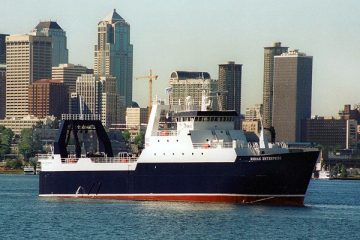 A Coast Guard Air Station Kodiak MH-65 Dolphin rescue helicopter crew medevaced a man from the 252-foot fishing vessel Kodiak Enterprise approximately 40 miles north of Cold Bay, Alaska, Friday afternoon. The rescue helicopter crew transported the 55-year-old fisherman to Cold Bay and were met by LifeMed Alaska personnel who transferred the patient to Anchorage for further medical care. Watchstanders at Coast Guard 17th District in Juneau received notification from Health Force Partners requesting a medevac for a crewmember who was reportedly suffering from an abdominal medical condition. The duty flight surgeon recommended the medevac and the helicopter crew was dispatched from Dutch Harbor. Weather on scene during the time of the medevac was reported as 15-mph winds with 3-foot seas and 10 miles of visibility. Link 13:14
A Coast Guard Air Station Kodiak MH-65 Dolphin rescue helicopter crew medevaced a man from the 252-foot fishing vessel Kodiak Enterprise approximately 40 miles north of Cold Bay, Alaska, Friday afternoon. The rescue helicopter crew transported the 55-year-old fisherman to Cold Bay and were met by LifeMed Alaska personnel who transferred the patient to Anchorage for further medical care. Watchstanders at Coast Guard 17th District in Juneau received notification from Health Force Partners requesting a medevac for a crewmember who was reportedly suffering from an abdominal medical condition. The duty flight surgeon recommended the medevac and the helicopter crew was dispatched from Dutch Harbor. Weather on scene during the time of the medevac was reported as 15-mph winds with 3-foot seas and 10 miles of visibility. Link 13:14
Sea lions hinder salmon conservation
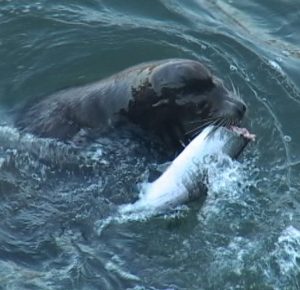 California and Steller sea lions took a bigger bite out of last year’s salmon run than in any previous year, according to a new federal report. 2015 saw a bigger run, with more than 239,000 chinook and steelhead migrating past Bonneville Dam. That year, the total number of salmon that sea lions ate was he largest ever recorded. The Army Corps of Engineers recorded more than 260 sea lions eating more than 10,000 fish from January to June 2015. The 2016 salmon run was far smaller, but the sea lions’ appetite for salmon didn’t shrink much. They still ate more than 9,500 fish, nearly 6 percent of the run. That’s the largest share of the run eaten by the large marine mammals since Army Corps scientists started watching 15 years ago. Read the rest here 12:43
California and Steller sea lions took a bigger bite out of last year’s salmon run than in any previous year, according to a new federal report. 2015 saw a bigger run, with more than 239,000 chinook and steelhead migrating past Bonneville Dam. That year, the total number of salmon that sea lions ate was he largest ever recorded. The Army Corps of Engineers recorded more than 260 sea lions eating more than 10,000 fish from January to June 2015. The 2016 salmon run was far smaller, but the sea lions’ appetite for salmon didn’t shrink much. They still ate more than 9,500 fish, nearly 6 percent of the run. That’s the largest share of the run eaten by the large marine mammals since Army Corps scientists started watching 15 years ago. Read the rest here 12:43
Oregon seeks compromise on Columbia salmon fishing reforms
 The chairman of the Oregon Fish and Wildlife Commission has offered to compromise with the Washington commission over their differences regarding the Columbia River salmon reforms. Earlier this year, the two state commissions approved reforms starting this year in how salmon are allocated between sport and commercial fishermen and allowable commercial fishing methods. Oregon opted for a plan more friendly to commercial fishing than did the Washington Fish and Wildlife Commission. Oregon Gov. Kate Brown then scolded the Oregon commission for reneging on a 2013 agreement to limit gillnetting to off-channel areas and told it to change the policy by April 3. Michael Finley, chair of the Oregon commission, sent a letter to Brad Smith, chair of the Washington commission, on Tuesday detailing his compromise proposals. By species, here is a look at Finley’s proposals: continue reading the story here 09:26
The chairman of the Oregon Fish and Wildlife Commission has offered to compromise with the Washington commission over their differences regarding the Columbia River salmon reforms. Earlier this year, the two state commissions approved reforms starting this year in how salmon are allocated between sport and commercial fishermen and allowable commercial fishing methods. Oregon opted for a plan more friendly to commercial fishing than did the Washington Fish and Wildlife Commission. Oregon Gov. Kate Brown then scolded the Oregon commission for reneging on a 2013 agreement to limit gillnetting to off-channel areas and told it to change the policy by April 3. Michael Finley, chair of the Oregon commission, sent a letter to Brad Smith, chair of the Washington commission, on Tuesday detailing his compromise proposals. By species, here is a look at Finley’s proposals: continue reading the story here 09:26
Celebrate the pragmatic elegance of gasoline marine engines
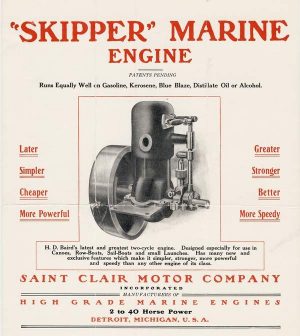 Gasoline marine engines revolutionized working life on the Columbia River estuary the way cotton gins did in the South, but they don’t get much respect. In the course of a half a tide, the river can go from mirror-like lake to something resembling a Michael Bay disaster movie. It’s a deceptive monster, one which generations of native and white fishermen were obliged to ride in little wooden boats. Until around 1900, the river’s sailing gillnet boats were at the whim of the wind, relying on canvas and oars to navigate the wild waters of the estuary and ocean plume in pursuit of salmon. Brave and courageous as they were, there wasn’t much they could do when a typhoon blew itself out on this fatal shore, driving boats onto the rocks like jellyfish drifted up on the beach. View five photo’s, and read the story here 15:24
Gasoline marine engines revolutionized working life on the Columbia River estuary the way cotton gins did in the South, but they don’t get much respect. In the course of a half a tide, the river can go from mirror-like lake to something resembling a Michael Bay disaster movie. It’s a deceptive monster, one which generations of native and white fishermen were obliged to ride in little wooden boats. Until around 1900, the river’s sailing gillnet boats were at the whim of the wind, relying on canvas and oars to navigate the wild waters of the estuary and ocean plume in pursuit of salmon. Brave and courageous as they were, there wasn’t much they could do when a typhoon blew itself out on this fatal shore, driving boats onto the rocks like jellyfish drifted up on the beach. View five photo’s, and read the story here 15:24
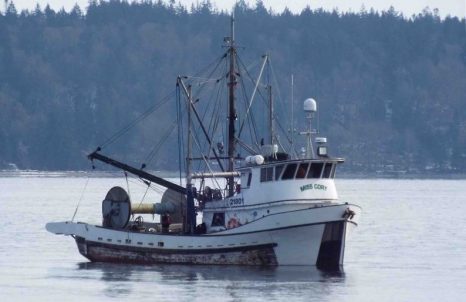
Seine roe-herring fishery opens with sinking of vessel, one crew member missing
STRAIT OF GEORGIA — The commercial seine roe-herring fishery opened Monday to disaster with the sinking of the vessel, Miss Cory, and a search underway for a missing crew member. Dan Bate, spokesman for Fisheries and Oceans Canada, said Marine Communications and Traffic Services in Victoria at 4 p.m. overheard a report that a fishing vessel had capsized off Cape Lazo near Comox on Vancouver Island. Four persons were recovered by another fishing vessel. The fifth crew member missing had been in the engine room during the capsizing and sinking in deep water, he said. The Canadian Coast Guard in Powell River and French Creek, near Parksville, are being enlisted in the search, along with a Canadian Forces Cormorant and search-and-rescue volunteers in Comox. continue reading the story here 23:58
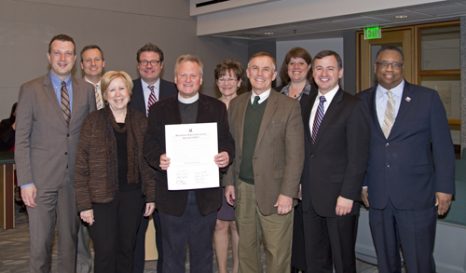
“Blessing of the Fleet” – County Council joins in wishing “safe fishing” to crews preparing to head to Alaska
Washington is known for having some of the best seafood in the world, much brought to our shores from crews preparing to go to Alaska for the summer fishing season. The Metropolitan King County Council today recognized those brave men and women who will spend their summer in the North Pacific by recognizing the “Blessing of the Fleet” which will occur this weekend, the start of the halibut fishing season. “Commercial fishing has been a foundation of our economy for over a century. Fishers risk their lives, and their families risk the loss of their loved ones every year. The fishing industry is an integral part of our King County community,” said Councilmember Jeanne Kohl-Welles, the sponsor of the recognition. “We also acknowledge the many years of participation by the Ballard First Lutheran Church in the annual Blessing of the Fleet. We wish the fleet an abundant and abundantly healthy start of the season!” continue reading the story here 21:40
The Pacific Fishery Management Council meeting in Vancouver, Washington. March 7-13, 2017
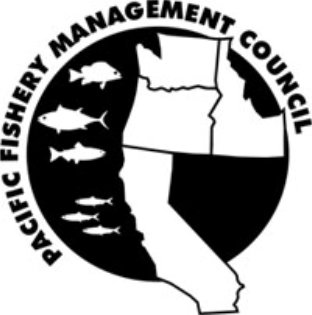 The Pacific Fishery Management Council (Council) and its advisory bodies will meet March 7-13, 2017 in Vancouver, Washington. Advisory bodies will start Tuesday, March 7. The Council session will start on Wednesday, March 8 to address issues related to salmon, groundfish, highly migratory species, ecosystem, Pacific halibut, and habitat matters. For agenda item topics, please see the March 2017 meeting agenda. The March 2017 Council meeting will be live‐streamed. Click http://www.gotomeeting.com/online/webinar/join-webinar Enter the Webinar ID – The March 8-13, 2017 Webinar ID is: 897-986-459 Please enter your email address (required) Click here for details 20:43
The Pacific Fishery Management Council (Council) and its advisory bodies will meet March 7-13, 2017 in Vancouver, Washington. Advisory bodies will start Tuesday, March 7. The Council session will start on Wednesday, March 8 to address issues related to salmon, groundfish, highly migratory species, ecosystem, Pacific halibut, and habitat matters. For agenda item topics, please see the March 2017 meeting agenda. The March 2017 Council meeting will be live‐streamed. Click http://www.gotomeeting.com/online/webinar/join-webinar Enter the Webinar ID – The March 8-13, 2017 Webinar ID is: 897-986-459 Please enter your email address (required) Click here for details 20:43
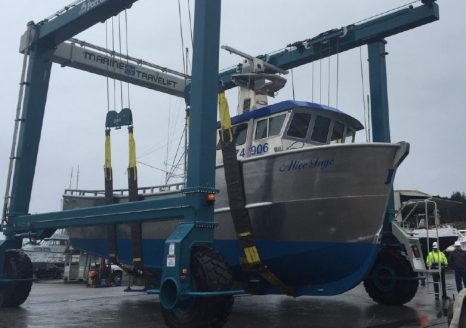
Tarheel Aluminum in Charleston launches first fishing boat since the ’90s
Tarheel Aluminum launched a fishing boat from the Charleston shipyard Friday, the first launch since the 1990s. The 40×15-foot aluminum vessel called the Alice Faye weighed in at 30,000 pounds on the shipyard’s new lift. It’s the first fishing vessel the family-run Tarheel Aluminum has made since the ’90s. Company owner Kyle Cox says their market buyers usually call for barges, so they’re excited to be making fishing vessels again. continue reading the story here with three more photo’s 16:43
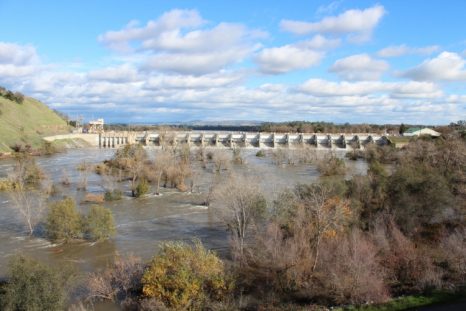
Low Numbers of Sacramento and Klamath River Salmon Point to Poor Season
Recreational and commercial fishermen attending the annual salmon fishery information meeting in Santa Rosa on March 1 received grim news from state and federal biologists – they will see reduced salmon fishing opportunities in both the ocean and the Sacramento and Klamath River systems, due to low returns of spawning fish to the rivers last fall. The pre-season numbers unveiled by Dr. Michael O’Farrell of the National Marine Fisheries Service estimate only 230,700 Sacramento River fall run Chinook adults and 54,200 Klamath River fall run adults will be in the ocean this year. Biologists noted that both forecasts are lower than those of recent years, with the forecast for Klamath fall run being among the lowest on record. Salmon originating from these river systems typically comprise the majority of salmon caught in the state’s ocean and inland fisheries. Ocean regulatory management for salmon fisheries on the ocean from Cape Falcon in Oregon to the Mexico-US Border is heavily based on these runs. continue reading the article by Dan Bacher here 11:22
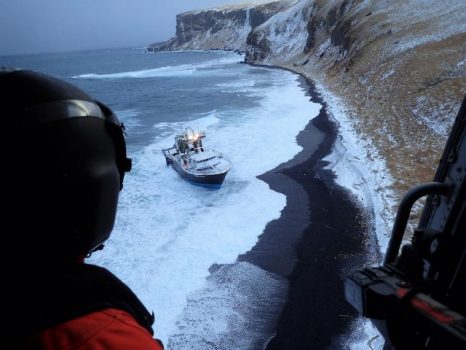
F/V Predator aground for more than two weeks
The grounded fishing vessel Predator remained on the beach in Akutan earlier this week. Salvage crews were attempting to re-float the boat. A large quantity of Pacific cod remains on board, while all the fuel has been removed. Resolve Magone Marine Service logistics coordinator David Maruszak, in Unalaska, said his company has been on the scene with about six salvage vessels for two weeks, but didn’t immediately try to pull the trawler free. An attempt on Monday to pull the boat free failed The re-float project had been underway for about a week, he said, they’re hoping for better luck in the next attempt. Earlier, he said Resolve removed about 5,000 gallons of fuel from the 93-foot-long vessel, homeported in Newport, Ore. Maruszak said the boat will require repairs before it resumes fishing, as several cracks have been noted in the hull, and that the next step once the boat is off the beach is for divers to conduct an underwater survey. Alaska Department of Fish and Game biologist Ethan Nichols in Unalaska said trawler was loaded with 300,000 pounds of Pacific cod, now unfit for human consumption. Read the article here 14:08 A side note! Tonight, I saw a photo of the vessel afloat. They got her off the beach. We will be looking for updates. 20:52
Commercial longline seasons to open March 11th, on time
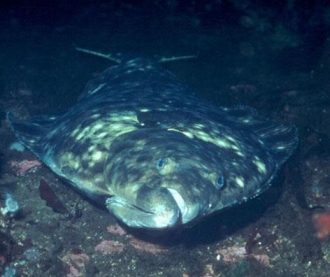 Commercial longliners in Alaska can go fishing on March 11 after all. The National Marine Fisheries Service announced Friday. March 3 that March 11th will be the start date for halibut and black cod fishing. March 11th is the halibut fishing start date approved by the International Pacific Halibut Commission back in January. The National Marine Fisheries Service typically opens long-line fishing for black cod on the same day. President Trump issued an executive order in January requiring that for every one new regulation issued, at least two prior regulations be identified for elimination. The start dates, catch share plan and other changes are all regulations that need to be published in the federal register. As of late last month, the National Marine Fisheries Service was still unsure of the impact of the presidential order on the fisheries. Fishermen in Alaska were questioning whether they’d be able to start fishing on that date. However, the federal agency confirmed Friday that the season would be starting on the 11th for both halibut and black cod. Read the rest here 08:52
Commercial longliners in Alaska can go fishing on March 11 after all. The National Marine Fisheries Service announced Friday. March 3 that March 11th will be the start date for halibut and black cod fishing. March 11th is the halibut fishing start date approved by the International Pacific Halibut Commission back in January. The National Marine Fisheries Service typically opens long-line fishing for black cod on the same day. President Trump issued an executive order in January requiring that for every one new regulation issued, at least two prior regulations be identified for elimination. The start dates, catch share plan and other changes are all regulations that need to be published in the federal register. As of late last month, the National Marine Fisheries Service was still unsure of the impact of the presidential order on the fisheries. Fishermen in Alaska were questioning whether they’d be able to start fishing on that date. However, the federal agency confirmed Friday that the season would be starting on the 11th for both halibut and black cod. Read the rest here 08:52
Ocean conditions appear improving for salmon
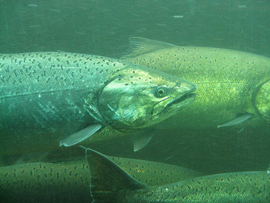 Warm water temperatures in the north Pacific Ocean are starting to cool after three years, but their effect on Northwest salmon will persist for another year or two. “Strange times, but things are looking up, that’s the message,’’ said Marisa Litz of the Washington Department of Fish and Wildlife. Litz made her comments on Tuesday at the agency’s annual unveiling of Columbia River, coastal and Puget Sound salmon forecasts. She recently completed her doctorate from Oregon State University in Fisheries Science, focusing on how variable ocean conditions affect growth and survival of young salmon in the Northwest. Tuesday’s meeting began a six-week process that concludes with the Pacific Fishery Management Council adopting ocean salmon fishing seasons in mid-April. continue reading the story here 11:31
Warm water temperatures in the north Pacific Ocean are starting to cool after three years, but their effect on Northwest salmon will persist for another year or two. “Strange times, but things are looking up, that’s the message,’’ said Marisa Litz of the Washington Department of Fish and Wildlife. Litz made her comments on Tuesday at the agency’s annual unveiling of Columbia River, coastal and Puget Sound salmon forecasts. She recently completed her doctorate from Oregon State University in Fisheries Science, focusing on how variable ocean conditions affect growth and survival of young salmon in the Northwest. Tuesday’s meeting began a six-week process that concludes with the Pacific Fishery Management Council adopting ocean salmon fishing seasons in mid-April. continue reading the story here 11:31
Hispanic man wins $1.85M judgment over racial abuse while crewing on an Alaska fishing vessel in 2011
 A Hispanic man who worked aboard an Alaska fishing vessel has won a $1.85 million settlement against his former employer, Seattle-based Alaska Longline, after being subjected to relentless racial harassment and dangerous working conditions, his attorneys said. Francisco Miranda, 37, and other Hispanic crew members were called “dirty Mexicans” and other racial epithets by the former captain and first mate of the Ocean Prowler in 2011, according to a stipulated judgment in the case. The captain also treated Hispanic crew members differently from those who were white and made comments like, “They should all swim back to Mexico,” the judgment says. A white crew member confirmed the allegations, testifying in a declaration that the captain was “racist towards the Mexican people on the boat …”, according to the judgment. continue reading the story here 09:17
A Hispanic man who worked aboard an Alaska fishing vessel has won a $1.85 million settlement against his former employer, Seattle-based Alaska Longline, after being subjected to relentless racial harassment and dangerous working conditions, his attorneys said. Francisco Miranda, 37, and other Hispanic crew members were called “dirty Mexicans” and other racial epithets by the former captain and first mate of the Ocean Prowler in 2011, according to a stipulated judgment in the case. The captain also treated Hispanic crew members differently from those who were white and made comments like, “They should all swim back to Mexico,” the judgment says. A white crew member confirmed the allegations, testifying in a declaration that the captain was “racist towards the Mexican people on the boat …”, according to the judgment. continue reading the story here 09:17
It’s good business to keep Bristol Bay protections
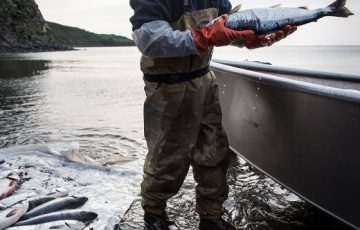 Regulations are in the crosshairs in Washington, D.C. these days. Those elected officials and appointed agency leaders have been clear in their goal to get rid of regulations they say are blocking jobs and economic activity. I humbly suggest that in this flurry to slash red tape, one Environmental Protection Agency protection should stay in place: the one protecting the Bristol Bay fishery in Alaska from the controversial Pebble Mine. I guarantee you the EPA’s plan to restrict mine waste disposal in Bristol Bay waters protects jobs and economic activity: those of my family and the 14,000 others who rely on our nation’s most valuable salmon fishery. In fact, we Alaskans call the sockeye salmon that return to Bristol Bay in their annual spawning runs “red gold.” Bristol Bay is the largest wild salmon fishery remaining anywhere in the world. For thousands of years, those fish have represented not just survival, but wealth. continue reading the op-ed here by Kim Williams 09:08
Regulations are in the crosshairs in Washington, D.C. these days. Those elected officials and appointed agency leaders have been clear in their goal to get rid of regulations they say are blocking jobs and economic activity. I humbly suggest that in this flurry to slash red tape, one Environmental Protection Agency protection should stay in place: the one protecting the Bristol Bay fishery in Alaska from the controversial Pebble Mine. I guarantee you the EPA’s plan to restrict mine waste disposal in Bristol Bay waters protects jobs and economic activity: those of my family and the 14,000 others who rely on our nation’s most valuable salmon fishery. In fact, we Alaskans call the sockeye salmon that return to Bristol Bay in their annual spawning runs “red gold.” Bristol Bay is the largest wild salmon fishery remaining anywhere in the world. For thousands of years, those fish have represented not just survival, but wealth. continue reading the op-ed here by Kim Williams 09:08






